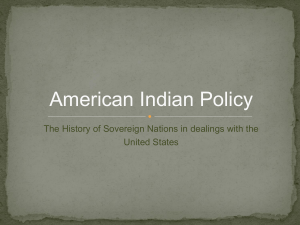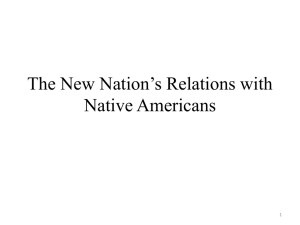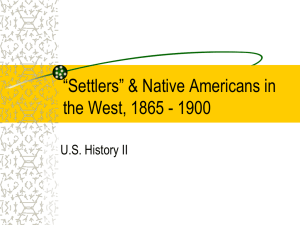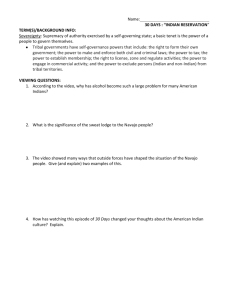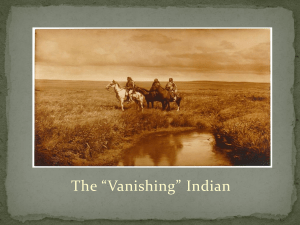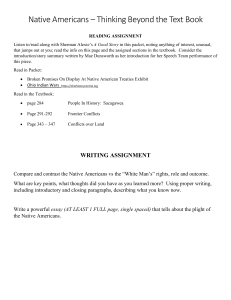Indian Nations, Tribal Sovereignty, and Tribal Government American Government
advertisement
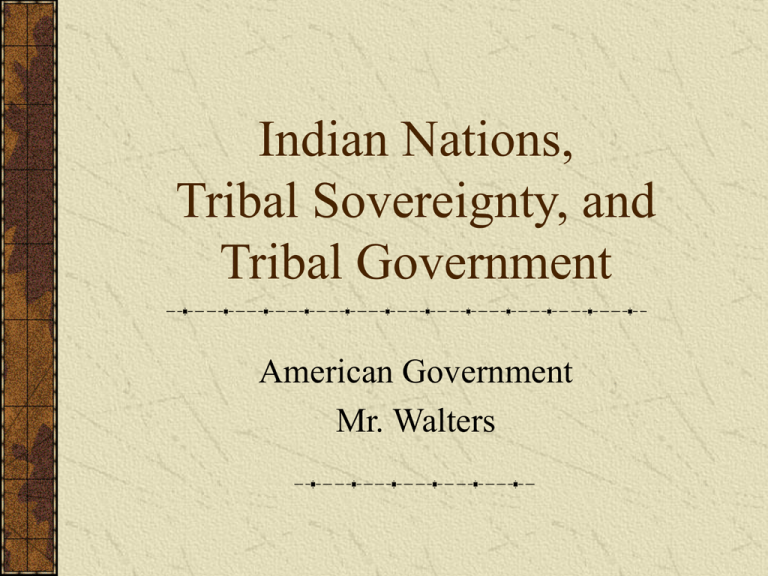
Indian Nations, Tribal Sovereignty, and Tribal Government American Government Mr. Walters Wisconsin has… 11 Different Groups 6 Different Tribes More Reservations than any other state east of the Mississippi River Courtesy of WI DPI Sovereignty and the concept of Trust Laid down by Constitution… North West Ordinance (1787)… Supreme Court Rulings… - Johnson v. McIntosh (1823) -Cherokee Nation v. Georgia (1831) -Worcester v. Georgia (1832) And Treaties Sovereignty and the concept of Trust Sovereignty – the right to rule/govern oneself Trust – The ownership of land in trust was in the hands of a person with responsibility to manage it for the benefit of another person Sovereignty Citizenship Citizenship wasn’t granted to American Indians until 1924 Greatly due to service in WWI Is this considered dual-citizenship? Major Treaties in WI Treaty of 1825, Prairie du Chien The Pine Tree Treaty, 1837 The Copper Treaty, 1842 The Wisconsin Death March – Removal to Sand Lake Treaty of 1854 Treaties in WI Map of the Ceded Territory and some current Ojibwe Reservations From GLIFWC Removal to Sandy Lake Image From Patti Loew’s, Native People of Wisconsin “A Message from the President*” “Great nations like great men must keep their word. When America says something, America means it, whether a treaty or an agreement or a vow made on marble steps.” - Inaugural Address, George Bush January 20, 1989 *Not the current President Congressional Acts Dealing with American Indian Politics Major Crimes Act (1885) Dawes Act/Allotment Act (1887) Wheeler – Howard Act/Indian Reorganization Act (1924) Effects of the 1854 Treaty and Allotments Reservation Original Size (in acres) Estimated Size in 1935 (in acres) Red Cliff Bad River Lac Courte Oreilles Lac du Flambeau St. Croix 7,321 124,332 70,000 5,176 90,855 43,416 70,000 not established until 1934 54,673 1,200 Mole Lake not established until 1934 1,700 The IRA Title I: est. tribal governments [patterned much like American Gov’t. with constitutions], tribal laws, chartered tribal businesses Title II: education, Indian preference in the BIA Title III: repeals allotment system, money for new trust lands American Indian Movement After WWII and with urbanization there is a major shift. In the 1960s, with the Civil Rights Movement in full action, American Indians start up their own civil rights organizations American Indian Movement In Wisconsin 1970 – AIM helps members of LCO take over the NSP Dam in Winter, WI. This eventually leads to government support and settlement Treaties and Rights in WI All Paintings by Seth Eastman “We wish to hold on to a tree where we get our living…the Indians wish to reserve the privilege of hunting and fishing…” Treaties and Rights in WI -1974 – The Tribble Brothers are arrested for exercising their reserved rights -1978 – Fed. Court Rules against LCO -1983 – Appeals court reverses ruling -Supreme Court turns back States Appeal -PARR and STA interfere Treaties and Rights in WI The Opposition With spearing, GLIFWC was formed Helps regulate reserved rights Works with and cross-deputized with state DNR Common Myths “We gave them their Reservations” “Treaties are old pieces of paper and are no longer valid” Indians receive “special” rights “They [American Indians] lost their land fighting against the U.S. Government” “They don’t pay taxes” “Indians get money for being Indian”
